


Heart-healthy nuts, such as almonds, walnuts, and pistachios, can be a wonderful ally in your journey towards better cardiovascular wellness. These nutritious options provide essential nutrients, healthy fats, and antioxidants that play a crucial role in lowering cholesterol levels and reducing inflammation.
Numerous studies highlight how regular consumption of these nuts can lead to improved lipid profiles and overall heart health. This makes them a beneficial addition to any diet, especially for seniors or those who may be facing existing heart risks.
Remember, taking small steps towards better health can make a significant difference in your well-being.
The significance of nutrition in fostering cardiovascular health is profoundly important, especially as we age and encounter unique dietary challenges. Heart-healthy nuts stand out as a supportive ally in this journey, packed with essential nutrients, healthy fats, and antioxidants that can greatly enhance heart wellness. But how can these small yet powerful snacks lead to real benefits for our heart health? This article explores ten types of heart-healthy nuts, uncovering their remarkable properties and the crucial role they play in preventing heart disease. We encourage you to rethink your snacking choices for a healthier future, knowing that every small step can make a difference.
At Amavita Heart and Vascular Health, we understand that nutrition is crucial for improving heart health, especially for seniors who face unique dietary challenges. Have you considered how heart healthy nuts could improve your cardiovascular well-being? Packed with essential nutrients, healthy fats, and antioxidants, nuts are a valuable addition to any heart-healthy regimen. Studies suggest that consistently including nuts in your diet is linked to lower cholesterol levels, reduced inflammation, and improved artery health—factors that are vital in preventing heart diseases.
For older adults, nuts can be an effective way to manage weight. They provide a satisfying snack that promotes feelings of fullness without contributing to weight gain. Research indicates that individuals who incorporated mixed nuts into their diets experienced reduced heart-related risk factors and better weight control compared to those who opted for less healthy snacks. Furthermore, nuts rich in omega-3 fatty acids, like walnuts, can help alleviate joint inflammation, which may enhance your ability to stay active.
We encourage our patients to consider these nutrient-dense options as part of their personalized treatment plans. By adding nuts to everyday dishes—whether as snacks, salad toppings, or baked goods—you can enjoy the many benefits these small but powerful foods offer. Ultimately, this simple change can significantly enhance your overall cardiovascular health and quality of life. Remember, you are not alone on this journey; we are here to support you every step of the way.
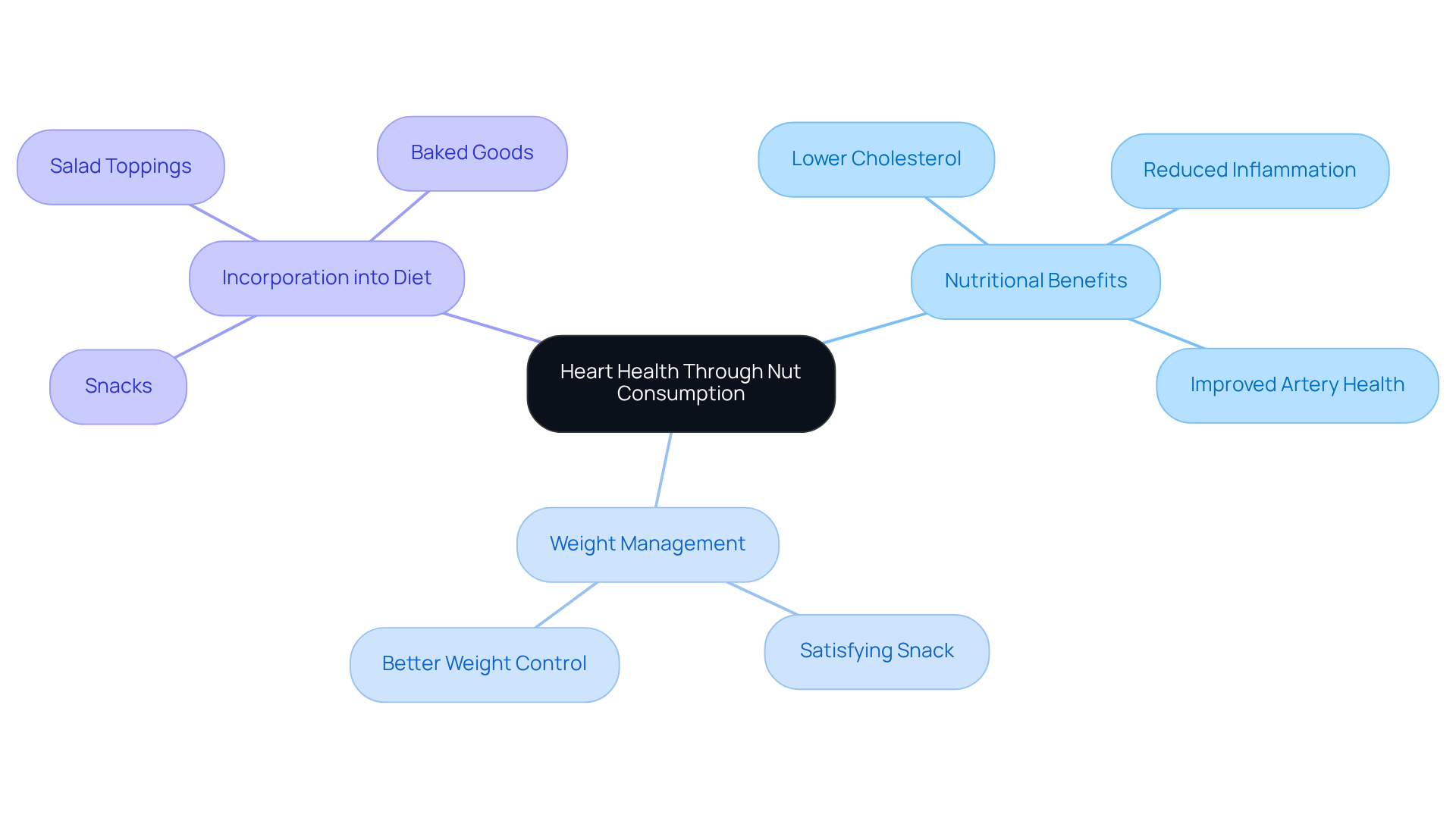
Almonds are truly a powerhouse of nutrients, rich in vitamin E, magnesium, and fiber, all of which play a significant role in enhancing cardiovascular health. Have you ever considered how just two ounces of almonds each day can lead to notable decreases in LDL levels, often referred to as 'bad' fat? This type of fat is a major contributor to heart disease risk. Research indicates that even one ounce of almonds daily can help reduce both LDL and total lipid levels without negatively impacting HDL, the 'good' fat.
In a clinical trial involving adults with metabolic syndrome, including those with diabetes and hypertension, participants who incorporated almonds into their diets experienced significant improvements in their lipid profiles, waist circumference, and gut inflammation. These findings highlight the importance of almonds as heart healthy nuts, providing essential nutrients that support heart function and overall well-being.
Moreover, the benefits of almond intake extend beyond cholesterol management; they also enhance the ApoB-to-ApoA ratio, a crucial indicator of heart attack risk. This makes almonds not just a delicious addition to your diet but also a wise choice for anyone looking to improve their circulatory health by including heart healthy nuts and reducing the risk of vascular diseases.
At Amavita Heart and Vascular Health, we understand the importance of comprehensive heart health management, especially for those at high risk, such as individuals with diabetes, hypertension, or a family history of heart disease. Our advanced imaging capabilities and personalized treatment plans ensure that dietary choices, like including almonds, are seamlessly integrated into your overall health strategy. As Dr. Laura M. Beaver, the lead author of a relevant study, wisely noted, "Two ounces daily is practical and easy to achieve." By adding almonds to your daily snacks or meals, you can take a simple yet impactful step towards promoting your heart health.
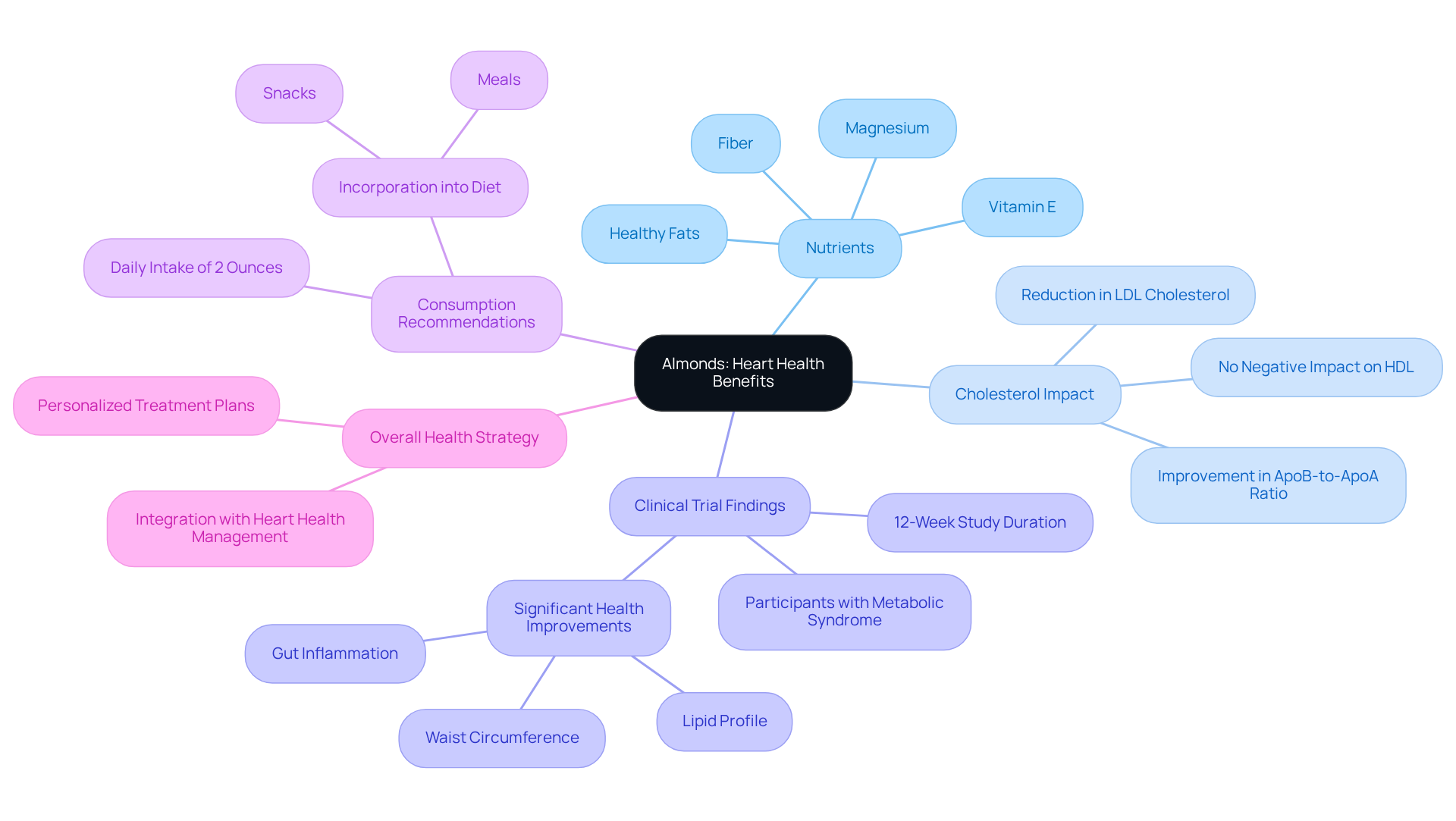
Walnuts truly shine as a wonderful source of alpha-linolenic acid (ALA), a plant-based omega-3 fatty acid that is celebrated for its significant benefits as one of the heart healthy nuts. Have you ever wondered how simple dietary changes can impact your well-being? Research reveals that incorporating heart healthy nuts such as walnuts into your diet can help reduce inflammation, lower blood pressure, and improve cholesterol levels, making them a valuable ally in your journey toward cardiovascular wellness. In fact, studies indicate that those who regularly enjoy heart healthy nuts, such as walnuts, experience a notable decrease in the risk of heart disease.
Embracing walnuts in your meals can be both easy and enjoyable. Consider adding them to your:
With their rich nutrient profile, walnuts are considered heart healthy nuts that not only bolster your heart health but also contribute to your overall well-being. Remember, making small changes can lead to significant improvements, and including heart healthy nuts like walnuts in your diet is a step worth taking. You deserve to feel your best, and incorporating these heart healthy nuts can help you on that path.
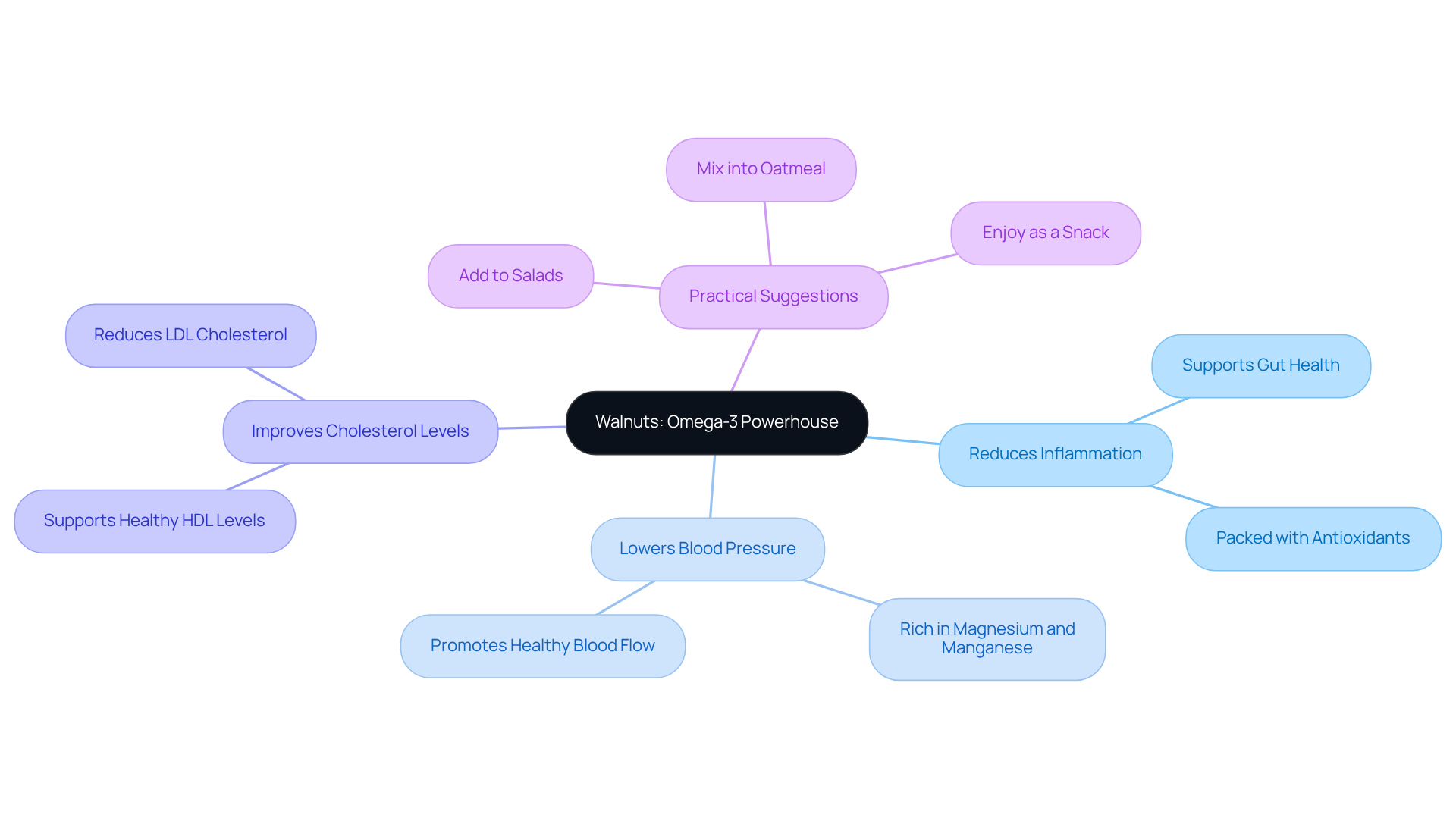
Pistachios are truly a powerhouse of monounsaturated fats and antioxidants, well-known for their ability to help reduce harmful lipids. Have you considered how adding pistachios to your diet could positively impact your health? Studies reveal that incorporating these delightful nuts can lead to significant improvements in lipid profiles, making them an excellent choice for cardiovascular wellness. In a recent study, participants who enjoyed two servings of pistachios daily saw an impressive 11.6% reduction in LDL cholesterol, a crucial factor in cardiovascular disease risk. This encouraging reduction suggests a potential decline in the risk of coronary artery disease by 9 to 12 percent.
Moreover, pistachios are not only nutritious; they also serve as a convenient and delicious snack option. With approximately 159 calories per ounce, they provide 6 grams of protein and 3 grams of fiber, which can help keep you feeling satisfied and support digestive well-being. The fiber content works to bind with LDL cholesterol, further promoting heart health.
Experts consistently emphasize the importance of including nutrient-dense foods like pistachios in a balanced diet. Their rich vitamin B6 content not only supports cognitive function but also boosts immune health. Additionally, the antioxidants found in pistachios help combat inflammation and oxidative stress. Overall, these tasty heart healthy nuts offer a wonderful way to enhance heart health, making them a wise addition to any heart-healthy diet. Remember, taking small steps like this can lead to significant improvements in your overall well-being.

Cashews are truly a powerhouse of essential minerals, especially magnesium, copper, and zinc, which are vital for maintaining optimal heart health. Did you know that just one ounce of cashews provides 73.7 milligrams of magnesium? This mineral plays a crucial role in regulating blood pressure, helping to lower the risk of hypertension and related heart issues. Research shows that adequate magnesium intake can lead to improved blood pressure control and overall cardiovascular function.
In addition to this, copper and zinc contribute to several physiological functions that promote cardiovascular wellness, including antioxidant protection and maintaining healthy blood vessels. Nutritionist Staci Gulbin highlights the antioxidant content of cashews, noting their significant anti-inflammatory and antimicrobial properties. By incorporating cashews into your diet, you not only enjoy a delicious snack but also enhance your intake of these essential nutrients, fostering better cardiovascular function and overall wellness.
For the best health benefits, consider consuming cashews raw or lightly roasted. These versatile heart healthy nuts can easily be added to yogurt, oatmeal, salads, or even used in baked goods, making them a simple yet effective addition to a heart-healthy diet. Remember, small changes can lead to significant improvements in your health, and you deserve to feel your best.
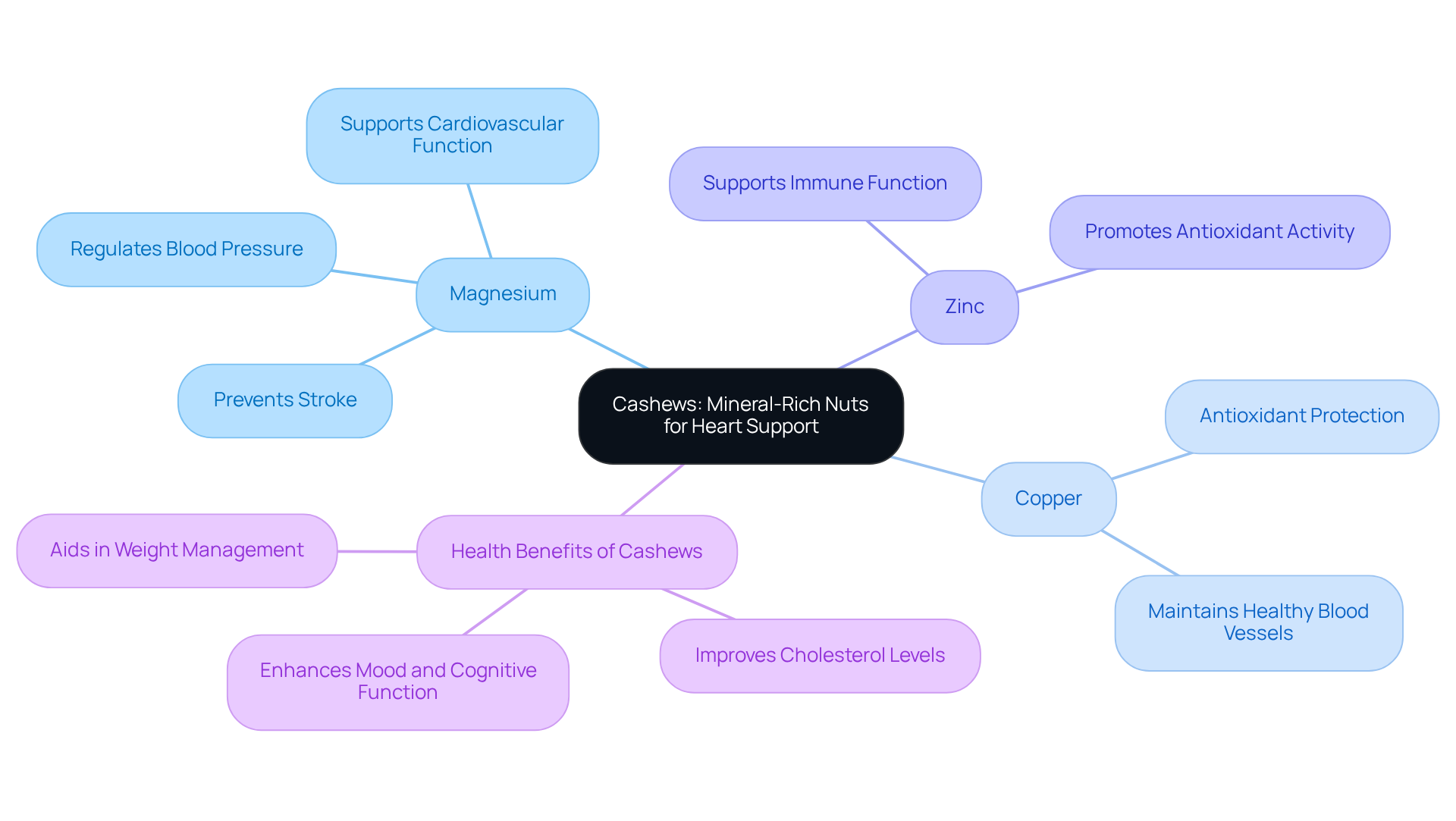
Pecans are truly a powerhouse of antioxidants, particularly vitamin E and phenolic compounds, which play a vital role in protecting your heart from oxidative stress. Have you ever considered how a consistent intake of pecans might positively influence your lipid levels? Research indicates that regularly enjoying pecans can lead to significant improvements, such as:
In a recent 12-week study, participants who replaced their usual snacks with 57 grams of pecans each day experienced meaningful reductions in harmful cholesterol markers, all while enhancing their overall diet quality.
Furthermore, the anti-inflammatory properties of pecans contribute to cardiovascular wellness, making them one of the best heart healthy nuts for a heart-healthy diet. Including pecans in your meals not only boosts flavor but also offers substantial wellness benefits. It’s comforting to know that such a delicious option can strengthen your heart health. Consider adding heart healthy nuts, such as pecans, to your daily routine; your heart will thank you for it.
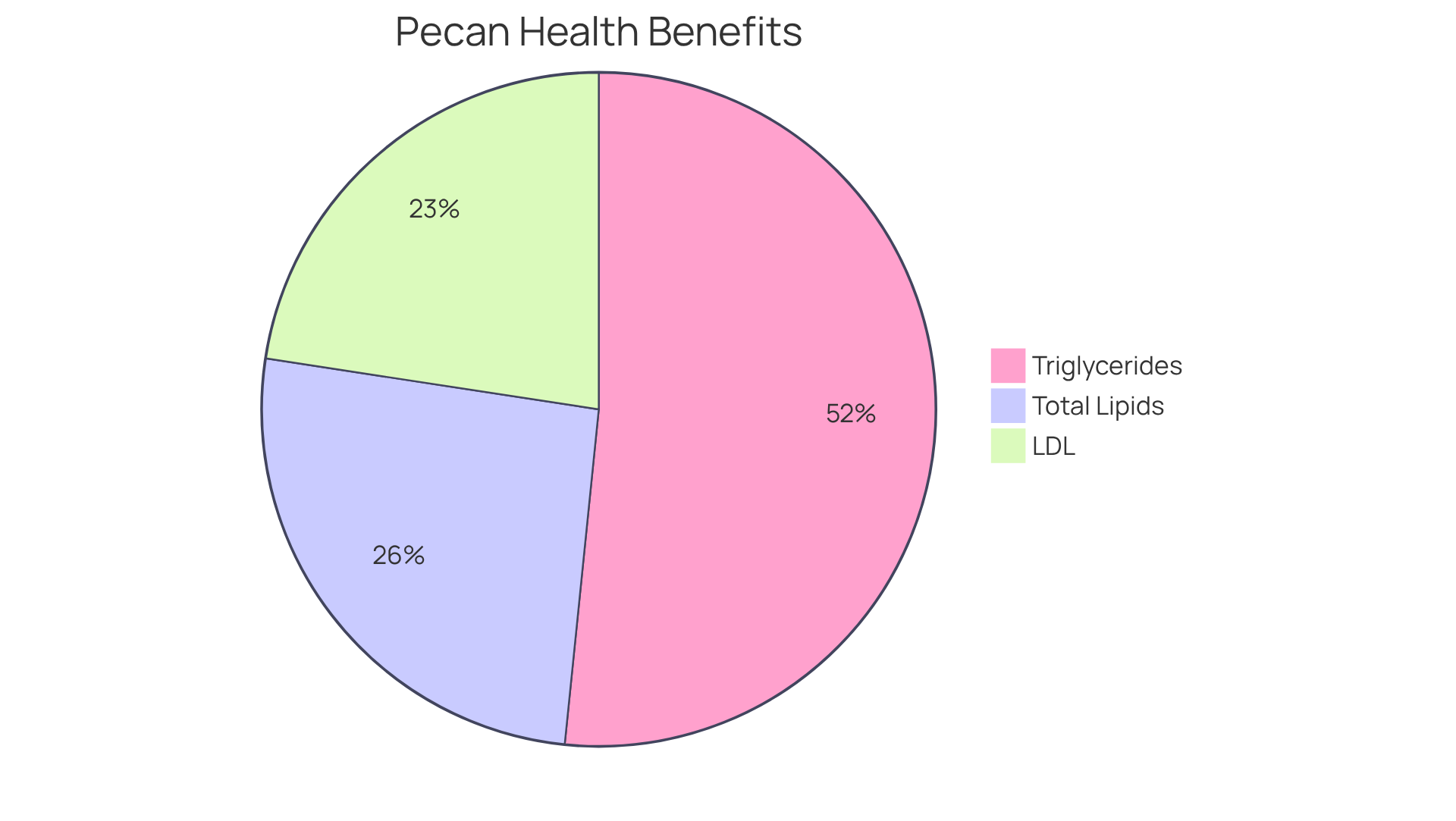
Brazil nuts stand out as one of the richest dietary sources of selenium, an essential mineral that significantly supports your cardiovascular well-being and immune function. Did you know that just one Brazil nut can provide around 175% of the recommended daily intake of selenium? This mineral is crucial for synthesizing thyroid hormones and protecting against oxidative stress. Regularly enjoying heart healthy nuts may help lower inflammation and enhance antioxidant defenses, both of which are vital for maintaining heart health. Research suggests that adding Brazil nuts to your diet can lead to improved lipid profiles, with these benefits lasting up to 30 days.
Furthermore, the role of selenium in bolstering immune function is well-established; it boosts the activity of immune cells, aiding your body in effectively combating infections. At Amavita, we understand that nutrition is a cornerstone of cardiovascular health. By incorporating heart healthy nuts, such as Brazil nuts, into your daily routine, you can nurture your cardiovascular function and overall well-being while savoring a delicious and nutritious snack. This dietary choice can complement the advanced cardiac therapies and thorough assessments we provide, ensuring a comprehensive approach to your health and wellness.
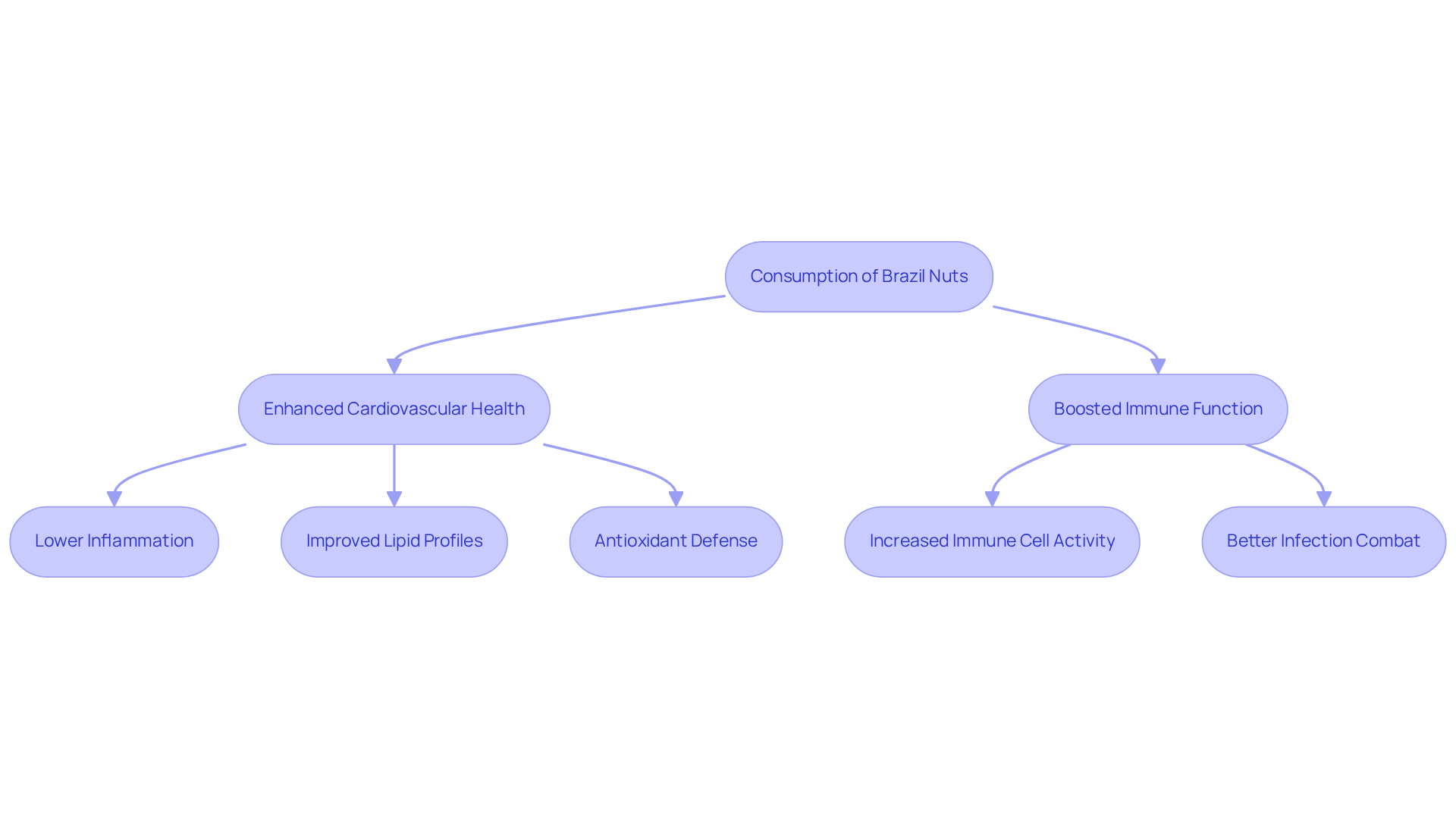
Macadamia nuts are a wonderful source of monounsaturated fats, which are vital for reducing LDL levels and lowering the risk of cardiovascular disease. Their creamy texture and rich flavor not only enhance the taste of various dishes but also play a significant role in supporting cardiovascular health. Have you considered how a diet rich in monounsaturated fats, like those found in macadamia nuts, can lead to improved lipid profiles and reduced inflammation? Both of these factors are crucial for maintaining heart health. Research indicates that regular consumption of heart healthy nuts like macadamia nuts is linked to lower total cholesterol and LDL cholesterol levels, making them a valuable addition to a heart-healthy lifestyle.
Furthermore, the antioxidants present in macadamia nuts, such as flavonoids and tocotrienols, may offer additional protective benefits against chronic illnesses, reinforcing their status as a superfood for cardiovascular wellness. At Amavita Heart and Vascular Health, we take pride in our holistic approach to heart health, integrating mindful dietary choices with advanced diagnostic imaging and personalized treatment plans. This includes minimally invasive procedures and thorough evaluations for high-risk patients.
While it's important to note that macadamia nuts are calorie-dense, containing about 204 calories per ounce, practicing portion control is essential for those managing their weight. If you have tree nut allergies, we encourage you to consult a healthcare professional before adding macadamia nuts to your diet. Incorporating these delicious heart healthy nuts into your daily routine can provide essential fats while also delighting your taste buds, complementing the comprehensive care available at Amavita. Remember, your heart health matters, and we're here to support you every step of the way.

Hazelnuts are truly a powerhouse of vitamins E and B, both essential for your heart's well-being. Vitamin E serves as a strong antioxidant, protecting your heart from oxidative harm, while B vitamins play a vital role in energy metabolism and overall circulatory function. You might be pleased to know that research shows regular consumption of hazelnuts can significantly boost your nutrient intake, contributing to enhanced cardiovascular health. For instance, studies have indicated that increased serum levels of vitamin E are associated with reduced mortality rates from heart diseases.
Furthermore, the anti-inflammatory properties of hazelnuts may further support your cardiovascular well-being by reducing chronic inflammation. By adding these nutrient-dense nuts to your diet, you not only enhance your heart health but also promote your overall well-being. Remember, taking small steps towards better nutrition can lead to significant improvements in your health. Why not consider incorporating hazelnuts into your meals today? You deserve to feel your best.
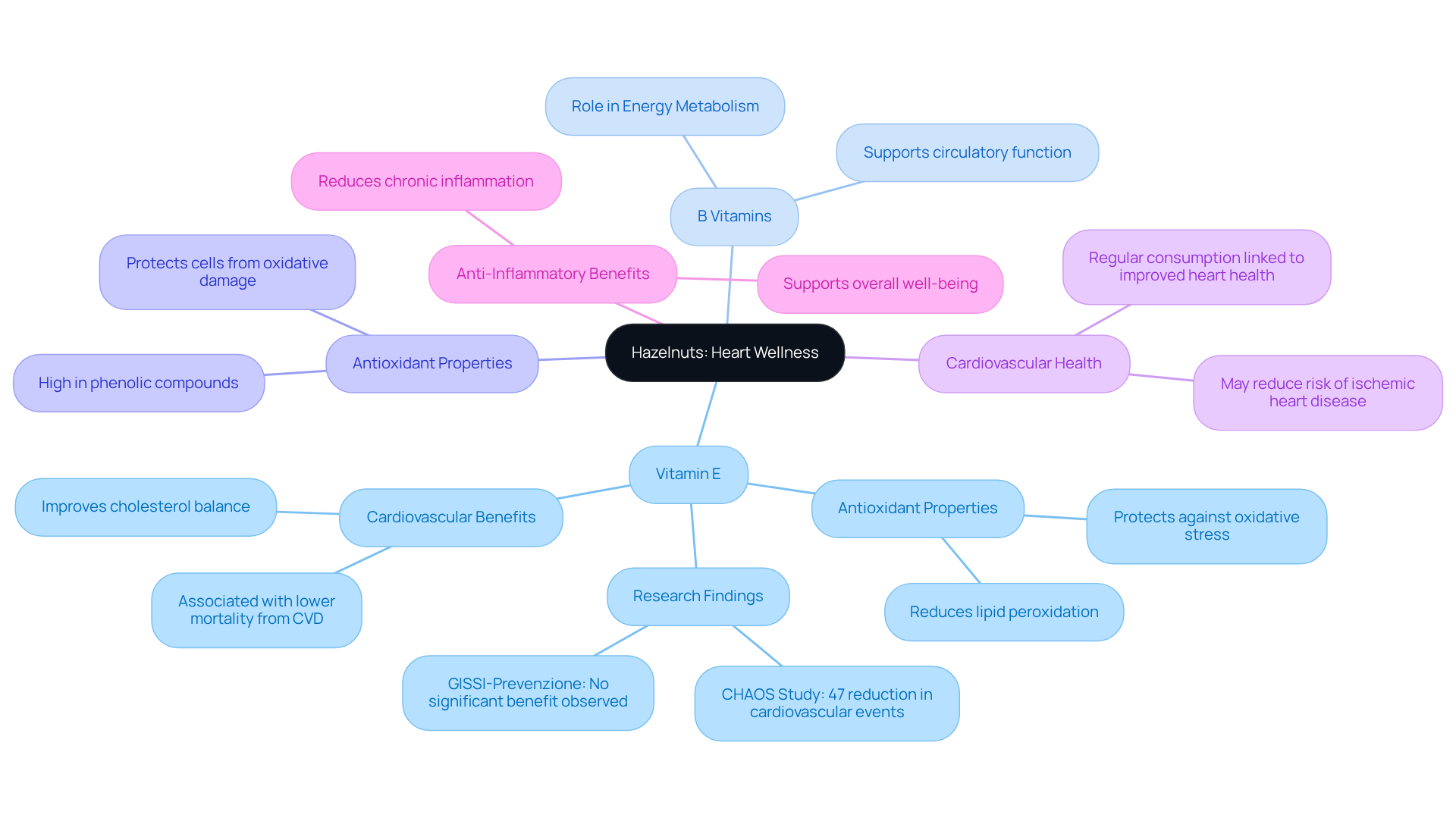
Peanuts are a wonderful source of protein, healthy fats, and essential vitamins and minerals, making them one of the best heart healthy nuts that support your heart health. With over 7 grams of protein per ounce, they stand out as a superior protein source compared to many other nuts. Rich in resveratrol, a powerful antioxidant, peanuts may help protect the endothelium, the inner lining of blood vessels. This can reduce the risk of atherosclerosis and improve overall heart function. Furthermore, peanuts are packed with magnesium, niacin, and copper, which are crucial for blood pressure regulation and cholesterol management. The American Heart Association recognizes peanuts as heart healthy nuts, emphasizing their benefits for circulatory wellness.
Including peanuts in your diet not only offers a tasty and satisfying snack but also promotes heart wellness, as they are among the heart healthy nuts due to their unique nutritional properties. For those at greater risk for cardiovascular issues, such as individuals with diabetes or hypertension, merging a nutritious diet with comprehensive cardiovascular care at Amavita Heart and Vascular Health can significantly enhance overall wellness. This includes advanced imaging and minimally invasive procedures tailored to your needs.
For a simple and nutritious snack, consider spreading peanut butter on whole-grain toast topped with banana slices. As you make these healthy choices, think about scheduling a comprehensive cardiac evaluation to further support your heart health. Remember, you are not alone on this journey; there are caring professionals ready to help you every step of the way.
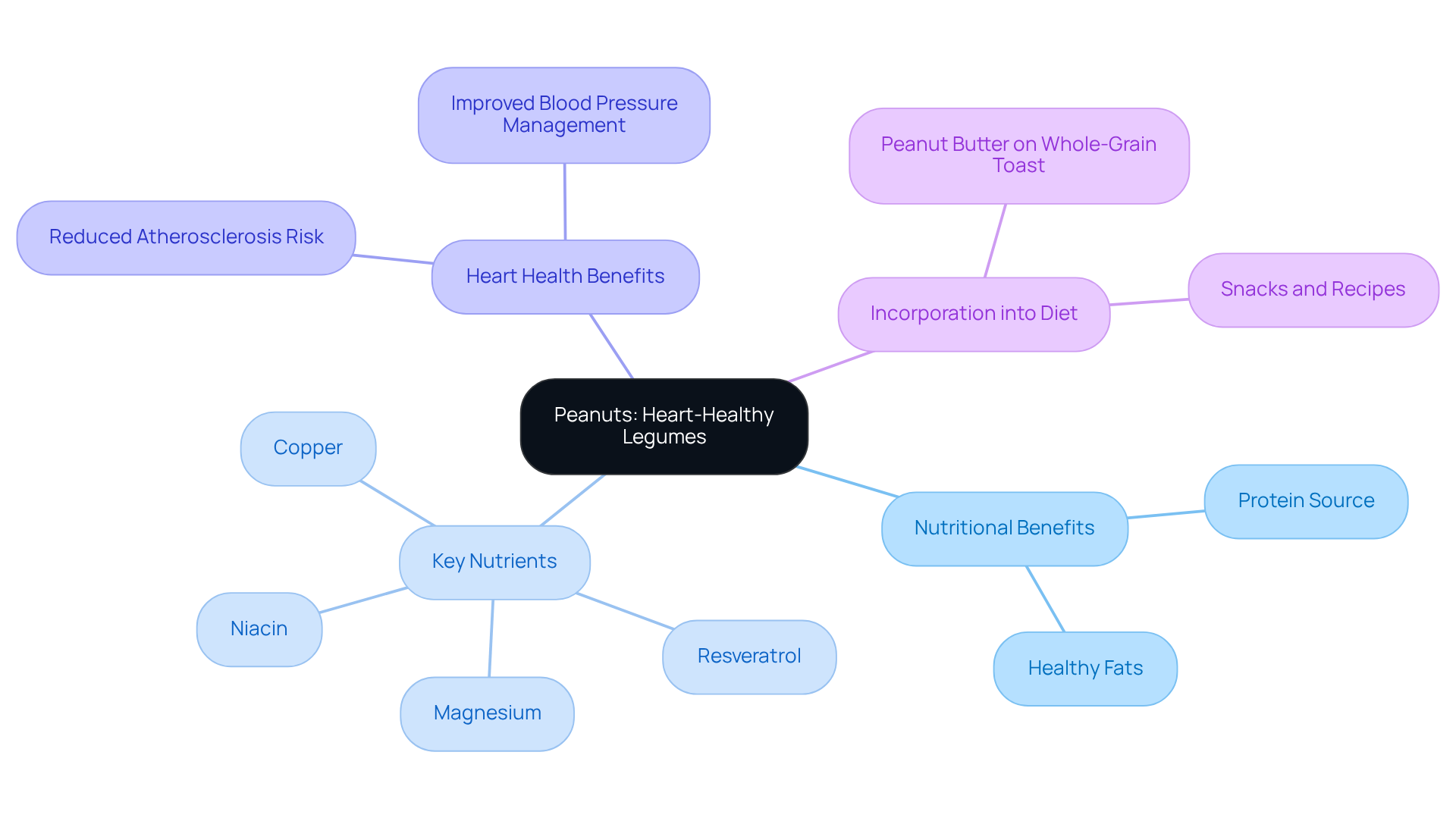
Incorporating heart-healthy nuts into your diet can be a simple yet effective way to enhance your cardiovascular wellness. These nutrient-dense foods not only provide essential vitamins and minerals but also play a crucial role in reducing the risk of heart diseases. By understanding the benefits of various nuts, you can make informed dietary choices that support heart health, especially if you are a senior facing unique nutritional challenges.
Throughout this article, we've highlighted the advantages of specific nuts like almonds, walnuts, and pistachios. Each type of nut contributes uniquely to heart health—whether it’s through lowering cholesterol levels, reducing inflammation, or providing vital nutrients like omega-3 fatty acids and antioxidants. The evidence presented underscores the importance of integrating these heart-healthy options into your daily meals to promote overall cardiovascular function and well-being.
Ultimately, embracing a diet rich in heart-healthy nuts is a proactive step towards improving your health and preventing cardiovascular issues. We encourage you to explore creative ways to incorporate these nuts into your meals and snacks while considering a comprehensive approach to heart health that includes regular check-ups and personalized care. By making these small yet impactful changes, you can significantly enhance your heart health and quality of life.
Why are nuts important for heart health, especially for seniors?
Nuts are packed with essential nutrients, healthy fats, and antioxidants, making them a valuable addition to a heart-healthy diet. They can help lower cholesterol levels, reduce inflammation, and improve artery health, which are crucial for preventing heart diseases.
How can nuts help manage weight in older adults?
Nuts provide a satisfying snack that promotes feelings of fullness without contributing to weight gain. Research shows that individuals who include mixed nuts in their diet experience better weight control and reduced heart-related risk factors compared to those who choose less healthy snacks.
What specific benefits do almonds offer for heart health?
Almonds are rich in vitamin E, magnesium, and fiber, which enhance cardiovascular health. Consuming just two ounces of almonds daily can significantly lower LDL (bad fat) levels and improve lipid profiles, waist circumference, and gut inflammation.
How do almonds affect cholesterol levels?
Research indicates that one ounce of almonds daily can reduce both LDL and total lipid levels without negatively impacting HDL (good fat), making them effective for cholesterol management.
What is the significance of the ApoB-to-ApoA ratio in heart health?
The ApoB-to-ApoA ratio is a crucial indicator of heart attack risk. Almond intake can enhance this ratio, making almonds a wise dietary choice for reducing the risk of vascular diseases.
What are the benefits of walnuts for cardiovascular wellness?
Walnuts are a great source of alpha-linolenic acid (ALA), a plant-based omega-3 fatty acid. They help reduce inflammation, lower blood pressure, and improve cholesterol levels, contributing significantly to cardiovascular wellness.
How can walnuts be incorporated into meals?
Walnuts can easily be added to salads, oatmeal, or enjoyed as a nutritious snack, making them a versatile option for enhancing heart health.
What is the overall message regarding the inclusion of nuts in the diet?
Including heart-healthy nuts like almonds and walnuts in your diet can lead to significant improvements in cardiovascular health and overall well-being. Simple dietary changes can have a positive impact on heart health.